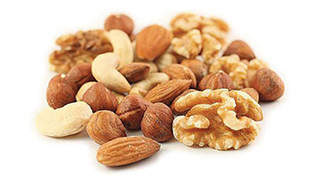 loading
loading
FindingsNoted Food Allergy CanadaView full imageHere’s a tasty way to help prevent colon cancer recurrence: eat nuts. Yale Cancer Center director Charles Fuchs and his team followed 826 patients post-surgery and post-chemotherapy for an average of 6.5 years; they found that those who ate at least two one-ounce servings of tree nuts weekly were 46 percent less likely to see their cancer return, and 57 percent less likely to die, than those who didn’t. The study was published in the Journal of Clinical Oncology. Previous studies showed that tree nut (but not peanut) consumption may also lower the overall risk of developing cardiovascular disease and type 2 diabetes.
Yale researchers may have identified a new factor in the opioid epidemic: a gene variant in European Americans associated with opioid dependence. Geneticist and psychiatrist Joel Gelernter ’79 and colleagues examined the genomes of over 5,000 people who used opioids. They found an increased risk for addiction in those who carried a particular variant of RGMA, a gene whose protein product is normally involved in cell death, nerve damage, and ailments such as stroke and Parkinson’s disease. The work appears in Biological Psychiatry and may, says Gelernter, “lead to novel treatments.”
Bad air can affect a developing fetus. Yawei Zhang ’03MPH, ’04PhD, an associate professor at the School of Public Health, and colleagues in China studied 8,000 moms-to-be living in Lanzhou, China, which often has high levels of air pollution. In the International Journal of Epidemiology, they report that a pregnant woman’s inhalation of pollutant particles is associated with abnormal growth of her fetus. One example: larger head circumference, which might lead to problems in delivery and higher risk of obesity and breast cancer.
The comment period has expired.
|
|